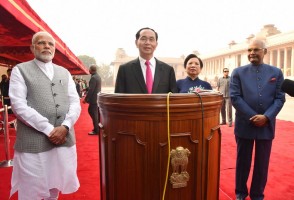
‘Government must address issues of Indian companies in China’
The Dollar Business Bureau  An industry body has asked the government to take urgent steps to reduce non-tariff barriers and ensure level-playing field for Indian companies in China. The Confederation of Indian Industry (CII) submitted a memorandum to the government a day before Prime Minister Narendra Modi was scheduled to begin his five-day tour to China, South Korea and Mongolia. Expressing concern over various challenges faced by Indian firms in IT, pharma and media sectors, the memorandum said that though the bilateral trade rose at a compound annual growth rate (CAGR) of 15% since 2007-08, the trade deficit has been burgeoning in an unsustainable manner. “Sectors such as IT, drugs and pharma, and media and entertainment pose several challenges for Indian companies. To contain the rising trade deficit between India and China, CII suggests urgent measures to reduce non-tariff barriers in these sectors,” said Chandrajit Banerjee, Director General, CII. The CII said that India is emerging as one of China’s fastest growing markets and trade deficit is likely to widen further. In 2014-15, the trade deficit between the two countries touched $48 billion. In IT sector, Indian firms have limited success with contracts from state-owned companies (SOEs). This is largely due to their inability to meet qualifying norms and certifications needed to bid for SOE and government projects, insistence on local entities in some provinces to avail subsidies thus reducing competitiveness, challenges in staff mobility amongst provinces due to ‘hukou’ system necessitating local offices in each project area, etc., the memorandum said. CII calls for a level-playing field for Indian IT companies and suggests identification of select joint pilot projects and joint development of an information platform for business development and academic cooperation in the IT sector. In the pharmaceutical sector, Indian firms have to undergo time-consuming and expensive approval processes and complex post-registration steps including pricing, provincial tendering and hospital listings. “Marketing and distribution also pose significant challenges given the large and diverse geography,” the CII said and recommended the setting up a Chinese regulatory office in India on the pattern of the US Food and Drug Administration (USFDA) for direct inspection of Indian facilities and faster approvals. The ‘fast-track’ initiative should be focused especially for specific molecules which are not available in China but can be provided by Indian companies at competitive prices. In the media and entertainment sector, Indian industry has limited forays in the Chinese market. While appreciating the recent agreement on co-production of films, CII said India can also make significant gains through direct release of more Indian films. A key reason for the limited success of Indian films in China is the imposition of an annual quota of 34 foreign films under the “imported movies” category which is dominated by films from Hollywood. Bollywood blockbuster 3 Idiots raked in US$ 1.9 million in first two weeks of release in China. CII suggested that Indian and Chinese film companies should take advantage of the co-production treaty between the two countries and explore collaborations for television contents as well. The CII memorandum also asked for the government support to marketing efforts by Indian industry in organising seminars, trade fairs, award ceremonies, etc. in collaboration with relevant industry bodies. “This may include fast tracked visas for relevant personnel participating in these initiatives, fast tracked approvals for events, etc,” it said. During the prime minister’s visit beginning Thursday, Indian and Chinese private companies are expected to sign business deals worth US$ 20 billion.
An industry body has asked the government to take urgent steps to reduce non-tariff barriers and ensure level-playing field for Indian companies in China. The Confederation of Indian Industry (CII) submitted a memorandum to the government a day before Prime Minister Narendra Modi was scheduled to begin his five-day tour to China, South Korea and Mongolia. Expressing concern over various challenges faced by Indian firms in IT, pharma and media sectors, the memorandum said that though the bilateral trade rose at a compound annual growth rate (CAGR) of 15% since 2007-08, the trade deficit has been burgeoning in an unsustainable manner. “Sectors such as IT, drugs and pharma, and media and entertainment pose several challenges for Indian companies. To contain the rising trade deficit between India and China, CII suggests urgent measures to reduce non-tariff barriers in these sectors,” said Chandrajit Banerjee, Director General, CII. The CII said that India is emerging as one of China’s fastest growing markets and trade deficit is likely to widen further. In 2014-15, the trade deficit between the two countries touched $48 billion. In IT sector, Indian firms have limited success with contracts from state-owned companies (SOEs). This is largely due to their inability to meet qualifying norms and certifications needed to bid for SOE and government projects, insistence on local entities in some provinces to avail subsidies thus reducing competitiveness, challenges in staff mobility amongst provinces due to ‘hukou’ system necessitating local offices in each project area, etc., the memorandum said. CII calls for a level-playing field for Indian IT companies and suggests identification of select joint pilot projects and joint development of an information platform for business development and academic cooperation in the IT sector. In the pharmaceutical sector, Indian firms have to undergo time-consuming and expensive approval processes and complex post-registration steps including pricing, provincial tendering and hospital listings. “Marketing and distribution also pose significant challenges given the large and diverse geography,” the CII said and recommended the setting up a Chinese regulatory office in India on the pattern of the US Food and Drug Administration (USFDA) for direct inspection of Indian facilities and faster approvals. The ‘fast-track’ initiative should be focused especially for specific molecules which are not available in China but can be provided by Indian companies at competitive prices. In the media and entertainment sector, Indian industry has limited forays in the Chinese market. While appreciating the recent agreement on co-production of films, CII said India can also make significant gains through direct release of more Indian films. A key reason for the limited success of Indian films in China is the imposition of an annual quota of 34 foreign films under the “imported movies” category which is dominated by films from Hollywood. Bollywood blockbuster 3 Idiots raked in US$ 1.9 million in first two weeks of release in China. CII suggested that Indian and Chinese film companies should take advantage of the co-production treaty between the two countries and explore collaborations for television contents as well. The CII memorandum also asked for the government support to marketing efforts by Indian industry in organising seminars, trade fairs, award ceremonies, etc. in collaboration with relevant industry bodies. “This may include fast tracked visas for relevant personnel participating in these initiatives, fast tracked approvals for events, etc,” it said. During the prime minister’s visit beginning Thursday, Indian and Chinese private companies are expected to sign business deals worth US$ 20 billion.
May 13, 2015 | 6:22 pm IST.






 to success.
to success.